

Major Philosophy: Experiments in Ontology: Baudrillard and Hyperreality. One of Baudrillard’s key insights is that upon radicalization, every theory (or system) is subject to the form of reversibility.
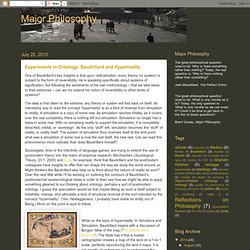
He is speaking specifically about systems of signification, but following the sentiments of his own methodology – that we take ideas to their extremes – can we not extend his notion of reversibility to other kinds of systems? The idea is that taken to the extreme, any theory or system will fold back on itself. An interesting way to read the concept ‘hyperreality’ is as a kind of reversal from simulation to reality. A simulation is a copy of some real. As simulation reaches totality, as it covers over the real completely, there is nothing left but simulation.
In the following I will present some of Jean Baudrillard’s theoretical claims about the mass media in the postmodern era. Mette Støttrup Jensen, The Teletubbies, Hyperreality and Narcissism Introduction In this assignment I wish to examine if the children’s television series the Teletubbies can be seen as a product of hyperreality and narcissism.
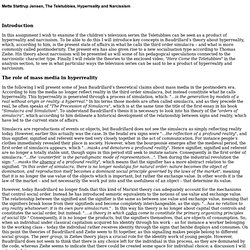
To be able to do this I will introduce key concepts in Baudrillard’s theory about hyperreality, which, according to him, is the present state of affairs in what he calls the third order simulacra – and what is more commonly called postmodernity. The present era has also given rise to a new socialisation type according to Thomas Ziehe. His theory about narcissism will be presented as will some of his pedagogical speculations connected to the narcissistic character type. Virtual Reality / Hyper-Reality. Virtual Reality / Hyper-Reality Virtuality and Simulation Imagine that you participated in a world where all the objects and all the people seemed real enough to touch but you knew--somewhere in your mind--that what you were experiencing was both constructed, and mediated by technology.
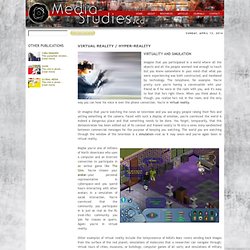
The telephone, for example. You're pretty sure you're having a conversation with your friend as if he were in the room with you, and it's easy to feel that he's right there. When you think about it, though, you realize he's not in the room, and the only way you can hear his voice is over the phone connection. Or imagine that you're watching the news on television and you see angry people raising their fists and yelling something at the camera. Maybe you're one of millions of North Americans who uses a computer and an internet connection to participate in an online game like The Sims. Virtual Reality: The Basics Alan Kay: Simulations and Education Virtual Reality: The Holy Grail I think it’s a big mistake. Hyperreality - eNotes.com Reference. Untitled. Hyperreality. Hyperreality.
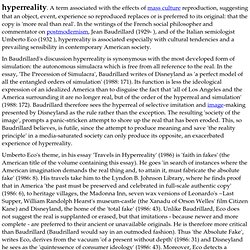
A term associated with the effects of mass culture reproduction, suggesting that an object, event, experience so reproduced replaces or is preferred to its original: that the copy is 'more real than real'. In the writings of the French social philosopher and commentator on postmodernism, Jean Baudrillard (1929- ), and of the Italian semiologist Umberto Eco (1932 ), hyperreality is associated especially with cultural tendencies and a prevailing sensibility in contemporary American society. In Baudrillard's discussion hyperreality is synonymous with the most developed form of simulation: the autonomous simulacra which is free from all reference to the real. Reality, hyperreality (1)
Reality, hyperreality (1) The Oxford English Dictionary defines reality foremost as "the quality of being real or having an actual existence" and supplements this with a definition of real as "having objective existence," and finally to exist as having "place in the domain of reality.
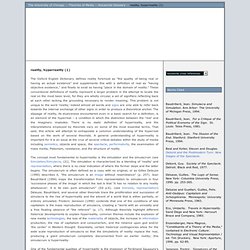
" These conventional definitions of reality represent a larger problem in the attempt to locate the real on the most basic level, for they are wholly circular, a set of signifiers reflecting back at each other lacking the grounding necessary to render meaning. This problem is not unique to the word ‘reality,’ indeed almost all words and signs are only able to refer back towards the internal exchange of other signs in order to produce a theoretical anchor. The slippage of reality, its elusiveness encountered even in a basic search for a definition, is an element of the hyperreal – a condition in which the distinction between the ‘real’ and the imaginary implodes. Nicholas OberlyWinter 2003.